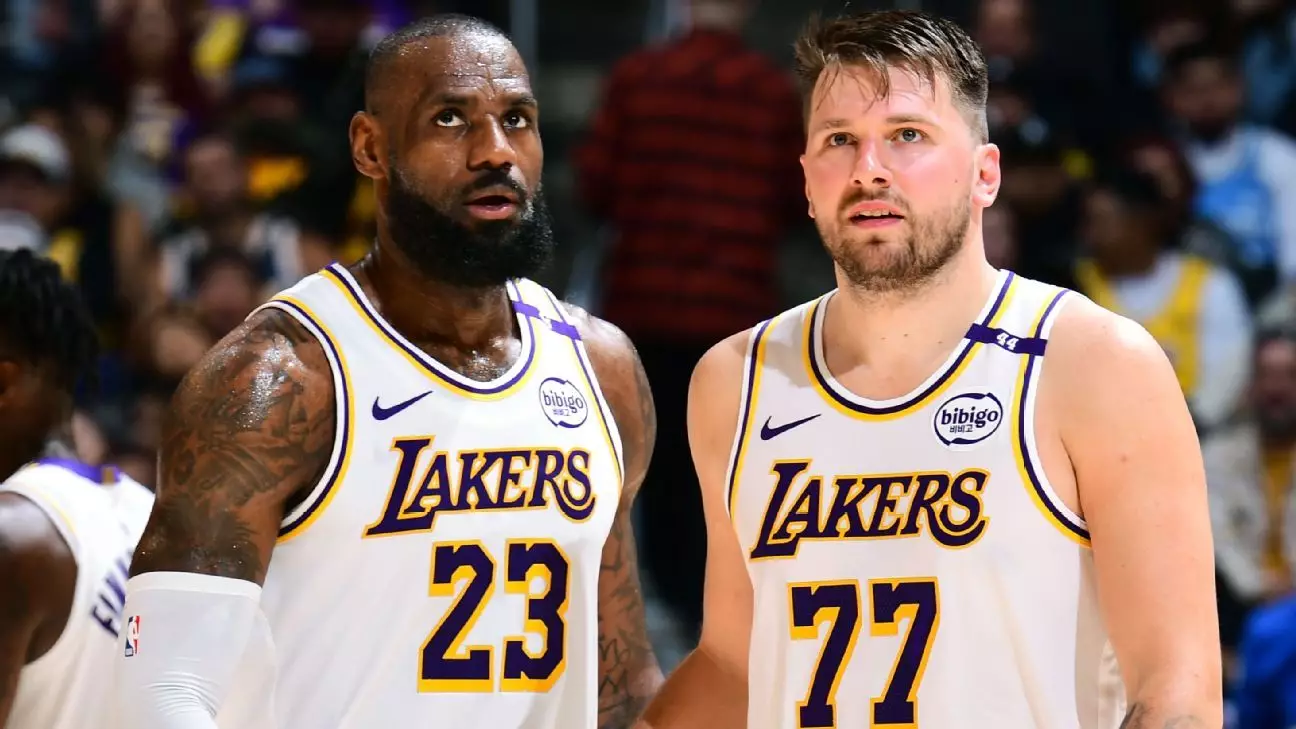In the fast-paced world of professional basketball, where contracts, trades, and headlines often overshadow genuine relationships, the recent interactions between Luka Doncic and LeBron James reveal a profound undercurrent of respect that transcends typical player dynamics. These moments illuminate how legendary athletes navigate their legacies, personal aspirations, and mentorship roles in tandem. Their exchange—marked by an immediate congratulatory call—asserts that amidst the glamour and commerce, authenticity and camaraderie still hold immense value. It’s a testament to James’s enduring influence and his mentorship-driven leadership approach, which seems to prioritize legacy not just for himself but for the next generation of stars like Doncic.
However, this relationship also underscores an interesting tension: the delicate balance between competitive ambition and personal loyalty. James’s public support for Doncic signals an aspirational bond — one rooted in mutual admiration. Yet, behind the scenes, the NBA landscape remains uncertain, and James’s future with the Lakers is far from resolved. Such complexities reveal much about the modern superstar’s internal conflict—striving for titles while grappling with the realities of aging, team-building, and legacy. The significance of these interactions is not merely about camaraderie; they serve as a subtle blueprint for leadership in a league driven by both individual brilliance and collective success.
The Complexity of LeBron’s Dual Identity: Superstar and Mentor
LeBron James’s actions surrounding Luka Doncic’s new contract extend beyond simple congratulations — they reflect his broader philosophy of nurturing talent and maintaining influence across the league. Despite James’s ongoing pursuit of titles, he clearly sees himself as an elder statesman, a pivotal mentor whose wisdom can shape the careers of superstars like Doncic. By reaching out privately, James demonstrates a strategic patience, understanding that fostering genuine relationships can yield long-term benefits for both himself and the franchise.
Yet, James’s decision to opt into his final Lakers contract year raises questions about his future, especially as his agent suggests he values a “realistic chance of winning it all.” This statement is loaded with implication: James is acknowledging the uncertainty of the Lakers’ trajectory and weighing his remaining years against a relentless drive for victory. It exposes a critical reality of aging superstars—balancing the desire to compete with the pragmatic acceptance of their finite prime. His actions symbolize a broader narrative: that true influence isn’t measured solely by numbers or titles but by the ability to shape the league’s culture and mentor its future stars.
Furthermore, James’s ambiguous stance about his retirement underscores a profound philosophical debate about legacy. Will he prioritize securing another championship, or will he focus on ensuring his influence endures through mentorship and storytelling? The Lakers have expressed respect for his timeline, yet the underlying tension is palpable: shifting from player to elder statesman is a complex transition, one that requires humility, strategic patience, and a willingness to put team ideals above personal ambitions.
Team Loyalty Versus Personal Aspirations: The Unfolding NBA Narrative
James’s relationship with the Lakers isn’t just about loyalty; it’s about a strategic chess match. The franchise’s willingness to accommodate his timetable indicates a recognition that leadership extends beyond mere performance on the court. The Lakers, as an organization, are navigating the delicate art of managing aging superstars while simultaneously building for the future. Their openness to James’s choices demonstrates an evolving understanding that a player’s longevity and impact are as important as the podium of victory.
Meanwhile, the league itself is shifting, with superstar movements and contract decisions now shaping narratives more than ever before. Luka Doncic’s extension, as one of the league’s brightest talents, signals a new chapter of stability and growth. Yet, the ongoing support and mentorship from veterans like James serve as vital bridges connecting legacy to evolving team strategies. James’s ongoing influence, regardless of contract status, elevates the Lakers’ identity from a team chasing titles to a franchise cultivating greatness over generations.
Critically, such dynamics also challenge the traditional notion of competitive loyalty. James’s approach suggests that “team-first” philosophy in the NBA is increasingly nuanced. It’s about respecting the organic relationships that develop amidst intense competition and recognizing that true leadership involves facilitating growth in others. His gestures toward Doncic are emblematic of this shift, transforming the player-star rivalry into a mentorship-driven culture that rewards long-term loyalty, mentorship, and shared aspirations.
Implications for the Future of the NBA and Its Icons
This entire saga offers a compelling glimpse into the evolving archetype of the NBA superstar. No longer are players solely measured by their scoring averages or championships; their roles as mentors, franchising pillars, and league builders are taking center stage. LeBron James embodies this transformation confidently. Meanwhile, Luka Doncic’s rising prominence indicates a new generation eager to inherit the mantle of greatness, along with its accompanying responsibilities.
The ongoing narrative challenges fans and analysts to rethink what it means to be a legend. Is it the championships? The personal stats? Or perhaps it’s the influence one exerts beyond the court—guiding younger players, fostering culture, and leaving a lasting imprint on the league’s evolution. In this high-stakes environment, relationships forged in respect and mentorship may prove to be more enduring than any trophy.
As the NBA continues to evolve amid new challenges—intensified competition, media scrutiny, and shifting franchise priorities—the stories exemplified by James and Doncic demonstrate that authenticity, loyalty, and leadership are still essential. In the end, the sport’s greatest icons may be those who succeed not only in winning titles but in shaping the league’s future through mentorship, respect, and strategic patience. If anything, their legacy will be determined by how they transition from stars to sages—guiding the next generation toward greatness with humility and purpose.

